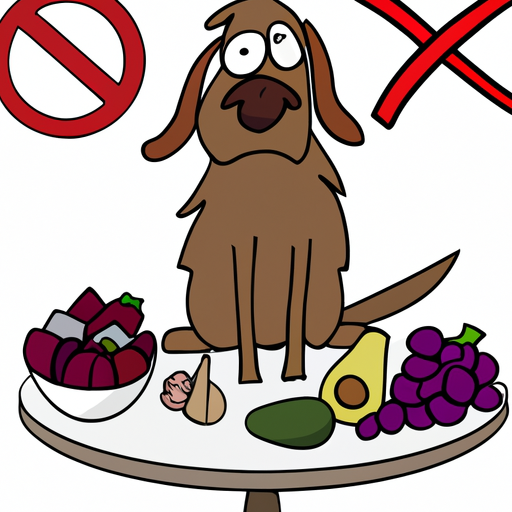As a dog owner, you have a responsibility for their well-being, which includes their diet. Just as certain foods are harmful to humans, there are foods that are dangerous for dogs. In this guide, we will go over the top eight types of food you should avoid feeding your furry friend.
1. Chocolate
Chocolate is perhaps the most well-known food that’s harmful to dogs. It contains theobromine, which can cause heart problems, muscle tremors, seizures, and even death.
Why is chocolate so harmful?
- Theobromine: Dogs metabolize theobromine more slowly than humans, leading to harmful build-up.
- Caffeine: Like theobromine, caffeine isn’t easily processed by dogs, and can cause similar symptoms.
- High Fat Content: Chocolate’s high fat content can lead to pancreatitis in dogs.
2. Grapes and Raisins
Grapes and raisins can cause kidney failure in dogs. Even a small amount can make a dog sick. Vomiting, lethargy, and depression are some of the symptoms.
Why are grapes and raisins harmful?
- Unknown Toxin: It’s unclear what in grapes and raisins causes toxicity, but their effects are well-documented.
- Kidney Damage: Consumption can lead to acute kidney failure, a life-threatening condition.
3. Onions and Garlic
Onions and garlic can cause anemia in dogs by damaging their red blood cells. This can lead to weakness, breathlessness, and an unwillingness to move. The effects may not be immediate, and could take a few days to appear.
Why are onions and garlic harmful?
- Thiosulfate: This compound, found in onions and garlic, is toxic to dogs but not to humans.
- Red Blood Cell Damage: Thiosulfate can cause oxidative damage to red blood cells, leading to anemia.
4. Caffeine
Caffeine is found in coffee, tea, soda, and energy drinks. It can cause restlessness, rapid breathing, heart palpitations, muscle tremors, and fits in dogs.
Why is caffeine harmful?
- Stimulant: Caffeine stimulates the nervous system, which can lead to symptoms like restlessness and rapid breathing.
- Cardiac Problems: Too much caffeine can cause abnormal heart rhythms.
5. Alcohol
Alcohol has the same effect on a dog’s liver and brain that it has on humans. However, it takes far less to do its damage.
Why is alcohol harmful?
- Nervous System Damage: Alcohol depresses the nervous system, which can lead to symptoms like disorientation and seizures.
- Digestive Issues: Alcohol can cause vomiting and diarrhea, leading to rapid dehydration.
6. Avocado
Avocados contain persin, a fungicidal toxin, which can cause serious health problems — even death — in many animals.
Why is avocado harmful?
- Persin: This toxin can cause vomiting and diarrhea in dogs.
- Pit: The avocado pit can cause choking or blockages in the digestive tract.
7. Dairy Products
Some dogs have no problem digesting milk and dairy products. Yet others experience acute intestinal upset — like gas, diarrhea or vomiting — whenever they consume these kinds of foods.
Why are dairy products harmful?
- Lactose: Dogs can be lactose intolerant, and consuming dairy can lead to digestive upset.
- High Fat Content: Like chocolate, high-fat dairy products can lead to pancreatitis.
8. Nuts
Many nuts, including almonds, pecans, and walnuts, are toxic to dogs. They can cause vomiting, diarrhea, and potentially pancreatitis.
Why are nuts harmful?
- High Fat Content: Again, the high fat content can lead to pancreatitis.
- Size: Small nuts can pose a choking risk or cause an intestinal blockage.
FAQs
1. Can dogs eat peanut butter?
Yes, dogs can eat peanut butter in moderation. However, it should not contain xylitol, a sweetener harmful to dogs.
2. Are raw bones safe for dogs?
Raw bones can be safe for dogs if they are large enough that the dog cannot swallow them whole. Cooked bones should be avoided as they can splinter and cause internal injuries.
3. Can dogs eat eggs?
Yes, dogs can eat eggs. Eggs are a great source of protein, but they should be cooked to avoid the risk of salmonella.
Remember, when in doubt about a food product for your pet, consult with a vet. They can provide guidance on what’s safe and what isn’t for your specific breed and size of dog. It’s always best to err on the side of caution to maintain your dog’s health and longevity.



